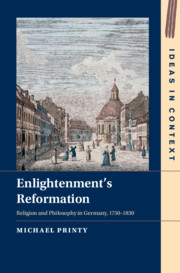Book contents
- Enlightenment’s Reformation
- Ideas In Context
- Enlightenment’s Reformation
- Copyright page
- Dedication
- Contents
- Acknowledgments
- Introduction
- Part I Recasting German Protestantism, 1750–1790
- Part II Revolutions of the Spirit, 1780–1830
- Chapter 4 Karl Leonhard Reinhold and the Philosophy of Protestantism
- Chapter 5 The Reformation and Modern Freedom
- Chapter 6 “True Sons of the Reformation”
- Epilogue Enlightenment’s Reformation, 1830–1929
- Bibliography
- Index
Chapter 4 - Karl Leonhard Reinhold and the Philosophy of Protestantism
from Part II - Revolutions of the Spirit, 1780–1830
Published online by Cambridge University Press: 21 December 2024
- Enlightenment’s Reformation
- Ideas In Context
- Enlightenment’s Reformation
- Copyright page
- Dedication
- Contents
- Acknowledgments
- Introduction
- Part I Recasting German Protestantism, 1750–1790
- Part II Revolutions of the Spirit, 1780–1830
- Chapter 4 Karl Leonhard Reinhold and the Philosophy of Protestantism
- Chapter 5 The Reformation and Modern Freedom
- Chapter 6 “True Sons of the Reformation”
- Epilogue Enlightenment’s Reformation, 1830–1929
- Bibliography
- Index
Summary
This chapter takes the philosopher Karl Leonhard Reinhold as a starting point to look at the ways in which critical philosophers sought to cast Kantianism as the heir to Protestantism. In his highly influential Letters on the Kantian Philosophy, Reinhold argues that the “first” Reformation of the sixteenth century was only a “preparation” for the current attempts to purify morality through philosophy. Situated in the context of Friedrich Heinrich Jacobi’s accusation that contemporary philosophy led to atheism (the so-called pantheism controversy or Spinozastreit) it traces Reinhold’s evolution from a proponent of the Catholic Enlightenment to an energetic advocate for Kantian philosophy at the University of Jena. Concluding briefly with Johann Gottlieb Fichte, the chapter shows how the new language of Protestantism discussed in the previous chapters proved fruitful for advocates of the new philosophy.
Keywords
- Type
- Chapter
- Information
- Enlightenment's ReformationReligion and Philosophy in Germany, 1750–1830, pp. 125 - 155Publisher: Cambridge University PressPrint publication year: 2024

